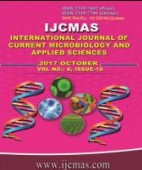


 National Academy of Agricultural Sciences (NAAS)
National Academy of Agricultural Sciences (NAAS)

|
PRINT ISSN : 2319-7692
Online ISSN : 2319-7706 Issues : 12 per year Publisher : Excellent Publishers Email : editorijcmas@gmail.com / submit@ijcmas.com Editor-in-chief: Dr.M.Prakash Index Copernicus ICV 2018: 95.39 NAAS RATING 2020: 5.38 |
Pertinent to various irrigation levels and their impact on mites, the biological parameters were found favourable in daily irrigation schedule followed by once in a week, indicating that daily irrigation is the most suitable moisture regime which supported as many number of T. urticae population by maintaining the cell turgor pressure and succulency of leaf which in turn encouraged the uninterrupted feeding process, which is the most suitable condition to favour biology of T. urticae. The biology of T. urticae was the highest on host plants where as the oviposition period in okra (18.1±0.43 days), in eggplant (17.5±0.60 days), in tomato (17.2±0.75 days), sex ratio and fecundity in okra (122±5.17/♀), eggplant (110±3.12/♀) and tomato (107±3.29/♀), were found to increase on different host plants tested, especially on okra. The higher moisture regime supported maximum load of T. urticae favouring growth and development on various host plants compared to infrequent watering schedules. The degree of water stress created was also of substantial importance as mite development was strongly suppressed under heavy drought or water stressed condition.
 |
 |
 |
 |
 |